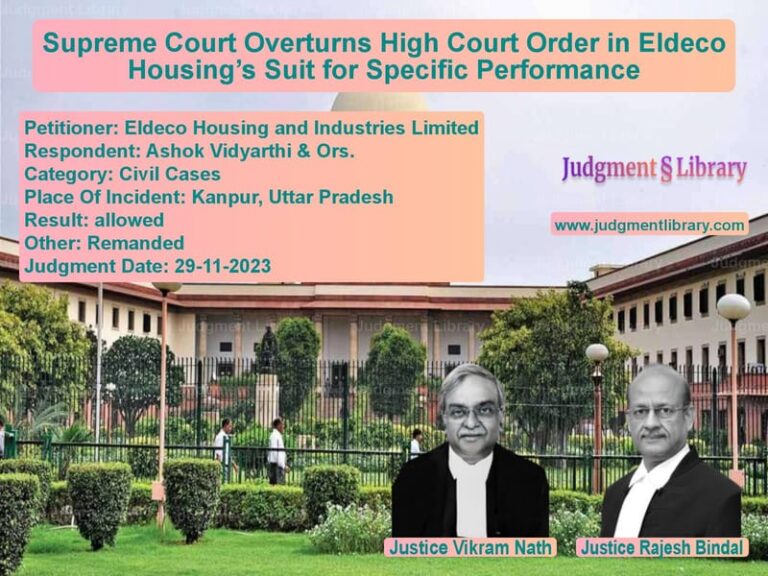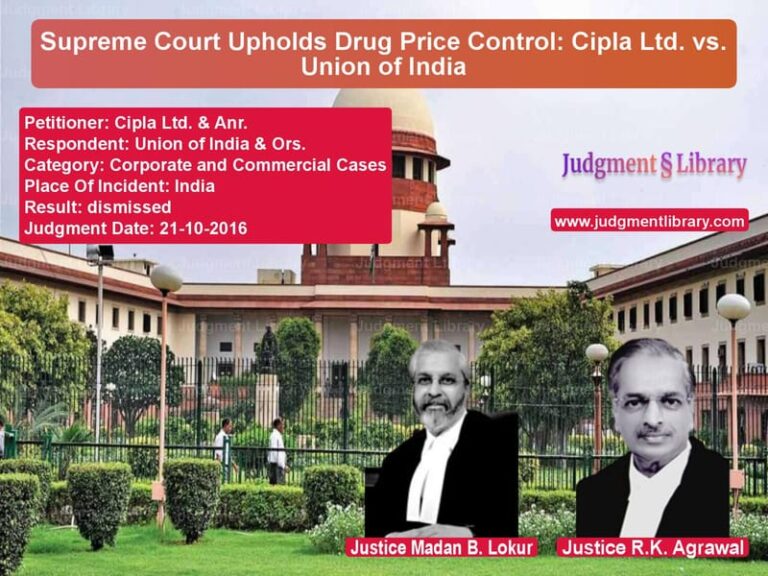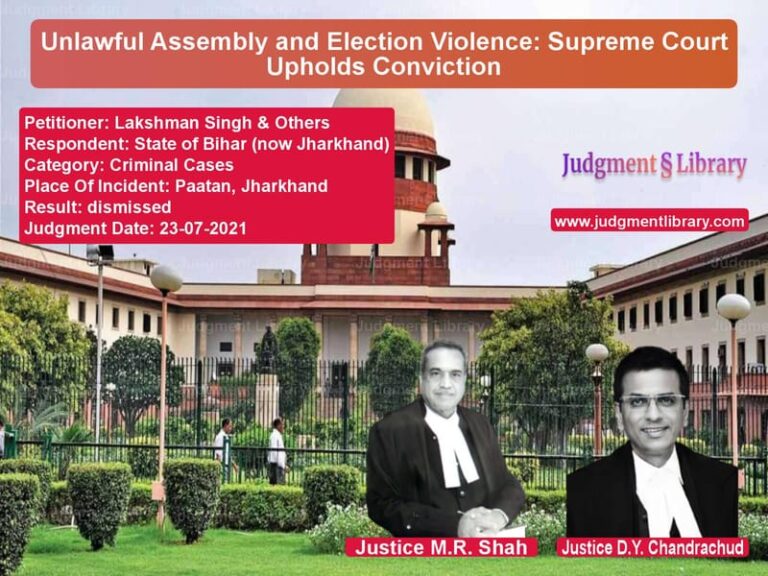D.N. Krishnappa vs. Deputy General Manager: Supreme Court Awards Back Wages in Industrial Dispute Case
The Supreme Court of India, in its judgment dated December 12, 2022, in the case of D.N. Krishnappa vs. The Deputy General Manager, ruled in favor of an employee seeking back wages for the period between the order of reinstatement and actual reinstatement. The Court quashed the Karnataka High Court’s judgment that had denied these wages and restored the order of the Central Government Industrial Tribunal (CGIT), ensuring that the workman was compensated for the period of non-reinstatement.
Background of the Case
The dispute arose from a dismissal order issued against the appellant, D.N. Krishnappa, who was employed at a bank. The dismissal, which took place on September 27, 1996, was challenged before the CGIT, which ruled in his favor on July 18, 2007. The Tribunal set aside the dismissal, ordered reinstatement with 50% back wages, and imposed a penalty of withholding four annual increments with a cumulative effect.
Both the bank and the appellant challenged the CGIT’s ruling before the Karnataka High Court. The High Court upheld reinstatement but reduced back wages from 50% to 25%. On further appeal, the Division Bench of the High Court upheld reinstatement but denied back wages entirely. The matter reached the Supreme Court after the appellant filed a case under Section 33-C(2) of the Industrial Disputes Act, 1947, seeking payment of wages from the date of the CGIT’s order until the actual reinstatement in 2013.
Arguments Presented
Petitioners’ (D.N. Krishnappa) Arguments
The appellant, represented by counsel, argued:
- The order of reinstatement dated July 18, 2007, had attained finality and should have been implemented without delay.
- The delay in reinstatement was due to the bank’s legal challenge, and the appellant should not suffer for the employer’s actions.
- The CGIT correctly directed the payment of wages from the date of the award until actual reinstatement.
- The High Court misapplied the Supreme Court’s judgment in Bombay Chemical Industries vs. Deputy Labour Commissioner, which dealt with unadjudicated claims rather than implementation of an existing award.
Respondents’ (The Deputy General Manager) Arguments
The bank, represented by its counsel, countered:
- The CGIT’s order remained stayed by the High Court, so the appellant was not entitled to wages during that period.
- The appellant was already paid last drawn wages under Section 17B of the Industrial Disputes Act, which precluded any additional claim.
- The final order of reinstatement was enforceable only after the Division Bench’s judgment on July 12, 2013, and back wages should not be awarded before that date.
- The principle of merger applies, and since the High Court modified the CGIT’s award, only the final order should be enforced.
Supreme Court’s Observations
The Supreme Court examined the case and held:
- “Once the reinstatement order is confirmed and attains finality, the workman cannot be denied wages due to the employer’s failure to implement the order.”
- “The principle of merger does not apply to deny wages for the period before the final judgment, as the interim order was always subject to the final decision.”
- “Even if the bank had obtained a stay on the reinstatement order, that does not absolve it from liability to pay wages once the order was upheld.”
- “The last drawn wages under Section 17B of the Industrial Disputes Act should be adjusted against the final payment, but they do not negate the right to full wages for the period in question.”
Judgment and Ruling
The Supreme Court ruled in favor of the appellant with the following key directions:
- The Karnataka High Court’s judgment was quashed and set aside.
- The CGIT’s order directing payment of wages from July 18, 2007, to September 23, 2013, was restored.
- The bank was directed to pay full wages with all emoluments for this period, deducting any amounts already paid under Section 17B of the Industrial Disputes Act.
- The appellant’s reinstatement was upheld with all benefits.
Implications of the Judgment
This ruling has significant implications for labor disputes and employment law:
- Protection of Employee Rights: Employers cannot delay reinstatement and escape liability for wages during the delay.
- Finality of Reinstatement Orders: Once an order of reinstatement attains finality, the employer must implement it without delay.
- Clarification on Section 33-C(2) of the Industrial Disputes Act: This section can be used to seek wages under a confirmed reinstatement order.
Conclusion
The Supreme Court’s ruling in D.N. Krishnappa vs. The Deputy General Manager reinforces the principle that an employee cannot be denied wages due to an employer’s delay in implementing a reinstatement order. By overturning the Karnataka High Court’s judgment, the Court ensured that justice was served for the workman, setting an important precedent for similar cases in industrial dispute law.
Petitioner Name: D.N. Krishnappa.Respondent Name: The Deputy General Manager.Judgment By: Justice M.R. Shah, Justice C.T. Ravikumar.Place Of Incident: Bengaluru.Judgment Date: 12-12-2022.
Don’t miss out on the full details! Download the complete judgment in PDF format below and gain valuable insights instantly!
Download Judgment: d.n.-krishnappa-vs-the-deputy-general-m-supreme-court-of-india-judgment-dated-12-12-2022.pdf
Directly Download Judgment: Directly download this Judgment
See all petitions in Employment Disputes
See all petitions in Public Sector Employees
See all petitions in Judgment by Mukeshkumar Rasikbhai Shah
See all petitions in Judgment by C.T. Ravikumar
See all petitions in allowed
See all petitions in Quashed
See all petitions in supreme court of India judgments December 2022
See all petitions in 2022 judgments
See all posts in Service Matters Category
See all allowed petitions in Service Matters Category
See all Dismissed petitions in Service Matters Category
See all partially allowed petitions in Service Matters Category







